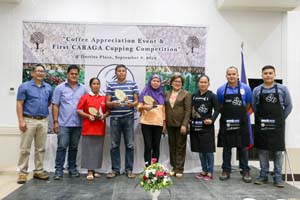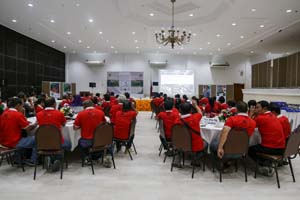Proving that Caraga coffee growers can give other coffee producers in the country a run for their money, 25 farmers’ associations competed recently in the first Caraga Coffee Cupping Competition conducted by the Department of Agriculture – Caraga in coordination with the Department of Trade and Industry.
Coffee cupping, performed by q-graders, determines the q-grade or quality grade of a coffee product.
 |
 |
In the said event, coffee producing farmers’ organizations each submitted two kilos of green coffee beans (GCB). However, only six groups advanced to the final round.
The Casiklan Wheels Farmers Association, Inc. of Las Nieves, Agusan del Norte bagged the top spot while the Tagbina Agrarian Reform Beneficiaries Multi-Purpose Cooperative and the San Jose Maasin Coffee Farmers’ Association took the 2nd and 3rd place respectively.
The Cupping Competition highlighted the Coffee Appreciation Event held on September 6 in Butuan City attended by coffee growers, entrepreneurs, and other stakeholders.
DA-Caraga High Value Crops Coordinator Marco Antonio Morido said the activity aims for coffee farmers to look at the bigger picture and realize that there’s more to coffee production by going the extra mile and engaging in processing for more income.
On the other hand, DA-Caraga Field Operations Division Chief Rebecca R. Atega said that the government is always behind to support the farmers in their endeavours. “DA’s interventions for coffee producers continue. These include distribution of quality planting materials and other inputs, pre and post harvest equipment, as well as technical assistance,” she said.
DTI-Caraga Assistant Regional Director Gay Tidalgo posed a challenge to the participants. “It’s a matter of doing it right, from the beginning up to the end,” she said, referring to farmer’s practices from production to processing.
In 2016, the Philippines ranked 17th among countries with top coffee production. Meanwhile, data from the Philippine Statistics Authority show that in 2017, Caraga ranked 8th among the regions in terms of coffee production with 1,583.20 tons.






